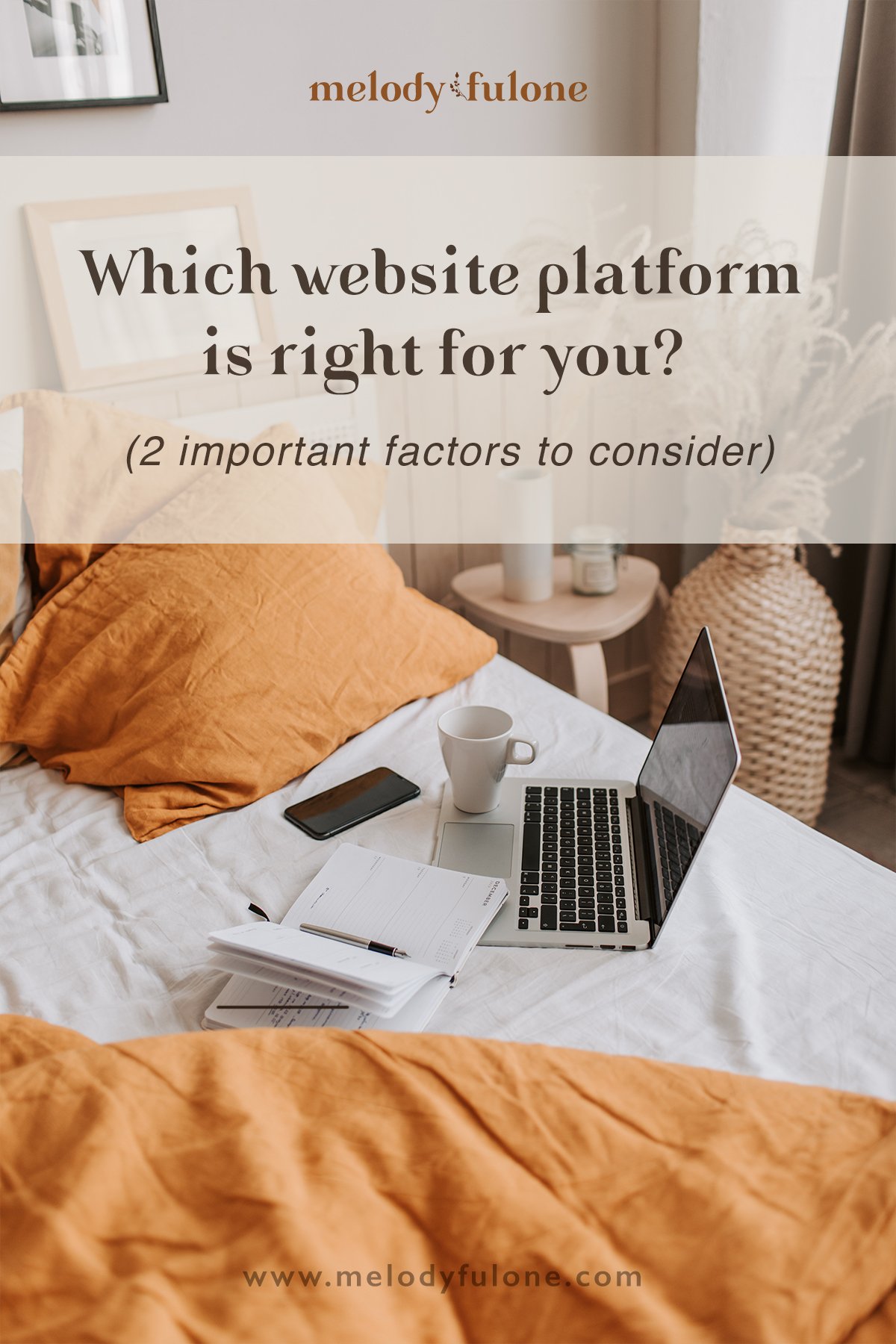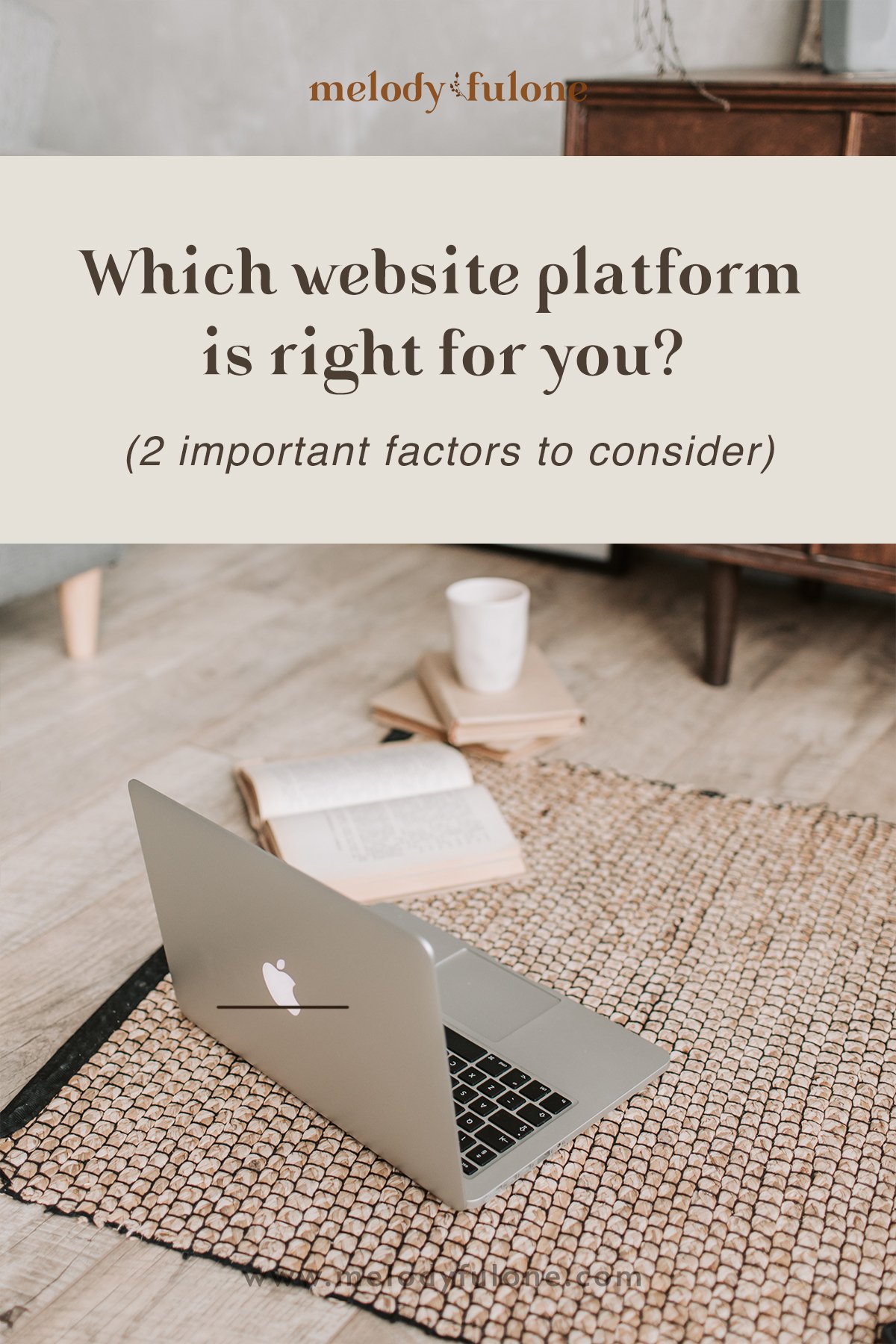Which Website Platform Should You Use for Your Business?
Choosing a website platform for your business is akin to being offered three separate plates of beautifully frosted sugar cookies – all of which look exactly the same – and being told to pick your favorite.
It’s not fun.
Now, many creative business owners and brands will choose to take one from each of the three sugar cookie trays, because decision fatigue sets in, and they don’t know whose advice they can trust, and whose they can’t. So they decide to try them all for themselves.
What happens after all three sugar cookie trays (AKA website providers) are demolished? Well, the cookie tester (you, the business owner) is not only uncomfortably full, but probably can’t figure out which cookie was best, after all is said and done.
So, choosing a website platform for your maker, artisan, service, or product business is really hard. I get it. So, I’m going to go ahead and save you the stomachache by reviewing and explaining three of the most common website providers out there: Shopify, Wordpress, and Squarespace.
By the end of this blog, you’ll know exactly which cookie website provider to choose!
A Review of Shopify, Wordpress, and Squarespace from a Brand Designer
First, I’ll start with a quick review of all three platforms. From there, I’ll walk you through the website provider decision-making process, so that you can choose the best platform for your specific business and brand.
Shopify
Shopify is a beautiful platform that offers a ton of customization. That said, those customization capabilities do come with a caveat: it’s not the most non-designer-friendly platform to use and upkeep.
Shopify’s strengths lie in its capabilities for product-based brands. If you’re not a product-based business, or if you’re a product-based business that doesn’t sell and stock a huge amount of inventory at a time, you might find that Shopify is just a bit too high-level for your liking.
I consider Shopify as the next step up from Squarespace. If you’re expanding your business in the next year with product collections, custom listings, or running an established business with a storefront and employee or two, Shopify is a great option to check out! Shopify offers an extended arsenal of tools you can use for marketing, reporting, and fulfillment. It’s a little more complicated to navigate behind the scenes, so if you are working with an employee or contractor who can help you manage your website, Shopify is a great choice.
Shopify pros: Customizable, beautiful interface & great option for product businesses.
Shopify cons: Can be difficult to DIY, which means that it can get expensive.
Wordpress
Alright, I’ve sandwiched this one in between two winners, in an attempt to keep things civil. The truth is that I do not enjoy Wordpress, and many of my clients have felt the same.
Wordpress’s merit lies in the fact that it offers complete customization and domain ownership. That’s great, right?
The not so great thing is that Wordpress’s complete customization capability means that Wordpress’s interface is not at all user friendly, requiring some fairly advanced web design and coding experience to achieve the look and feel you’re going for.
If you have a good amount of time on hand and want to learn how to master Wordpress for your service business’s website and blog, great! If you don’t have a ton of time on hand to learn how to make Wordpress work for you, you’ll need one of two things: money to keep a Wordpress design expert on retainer, or a different website provider.
(You know my answer to that, don’t you?)
Wordpress pros: Customization capability.
Wordpress cons: User hostility.
Squarespace
FINALLY, the star of the show! Squarespace is my one true love; the website provider I choose to use not only for myself, but for my clients with service and product-based businesses, too!
Not only does Squarespace offer the perfect amount of customizability, but it’s accessible to non-designers, too. This means that after I wrap up and deliver a branding and web design project, I can rest assured that my client will be able to access and update their site, without needing to invest in my services.
Squarespace is the perfect fit for makers, artisans, service providers, and even product-based brands with consistent inventory. It offers appointment scheduling, customizable intake forms, and even a commerce section where you can list your digital downloads, or physical products.
Squarespace is just the BEST OK?
In all seriousness, I want to show you just how great Squarespace can be for different brand types. So, here are a few examples!
Two things to consider when picking the *right* website provider for you
Now that you know the ins and outs of Wordpress vs. Squarespace vs. Shopify, I want to walk you through two points of consideration that’ll hopefully help make your decision-making process a breeze! Here’s a bit more information and detail about each platform, what they offer, and how they might serve you.
CONSIDERATION 1: your business type.
If you have a service-based business (coach, photographer, copywriter, social media manager, virtual assistant, etc) or product-based business with steady and consistent inventory, I always recommend Squarespace. The interface is extremely user-friendly, and even the most basic of websites looks sharp and professional. There are a variety of templates to start with, and a lot of customization is possible behind the scenes! Squarespace also offers lots of options when it comes to scheduling, booking, listing services for sale, and integrating with external CRM programs such as Honeybook and Dubsado.
Depending on how big your business is and how far along you are (more on this in a bit). Squarespace has a commerce plan that is easy to navigate, offers lots of options for keeping track of inventory and reporting, and makes it simple to integrate various shipping and payment options. However, the e-commerce features are admittedly a little clunky and reporting/customization is minimal, so I like to recommend Shopify for more mature businesses!
If you have a product-based business (artist, maker, white label, etc) with frequent inventory updates and drops, I recommend Shopify. Of course, that still comes with the caveat and knowledge that you might need to keep your Shopify designer on retainer in case things get just a bit too complex for you to update on your own.
Shopify offers a wide variety of tools to use for product-based businesses, including advanced reporting, fulfillment, marketing, and more. (In fact, Shopify is actually BUILT for product-based businesses, so you’re in good hands if you go that route). However, it’s not as simple to navigate behind the scenes, and may require a higher learning curve. This is different for everyone though – user interfaces are not always one-size-fits-all and I want to be sensitive to that.
consideration 2: where you’re at in your business!
Chances are if you’re reading this, you are what is commonly known nowadays as a “solopreneur”. This means you do pretty much everything in your business: admin, marketing, sourcing, creation, publishing, photography, design, etc. At this point in your business journey, I’m guessing you want to keep things SIMPLE. In that case, I recommend Squarespace! With minimal links on the back end, easy-to-navigate pages, and even an app you can download to manage your website on the go!
If you are a more mature business, with perhaps a storefront or more established presence and an employee or two, then it might be worth it to upgrade to Shopify. (Yes, I used the word ‘upgrade’ in spite of my deep love for Squarespace). For bigger businesses, Shopify has an extended arsenal of tools you can use for marketing, reporting, and fulfillment. It’s a little more complicated to navigate behind the scenes, so if you are working with an employee or contractor who can help you manage your website, Shopify is a great choice.
Did you decide that Squarespace is the provider for you?
Goooood choice.
I happen to be an illustrative brand designer for makers, artisans, service providers, and product brands… and I’d love to help you achieve the brand and website of your dreams. Click the button below to check out my services!






